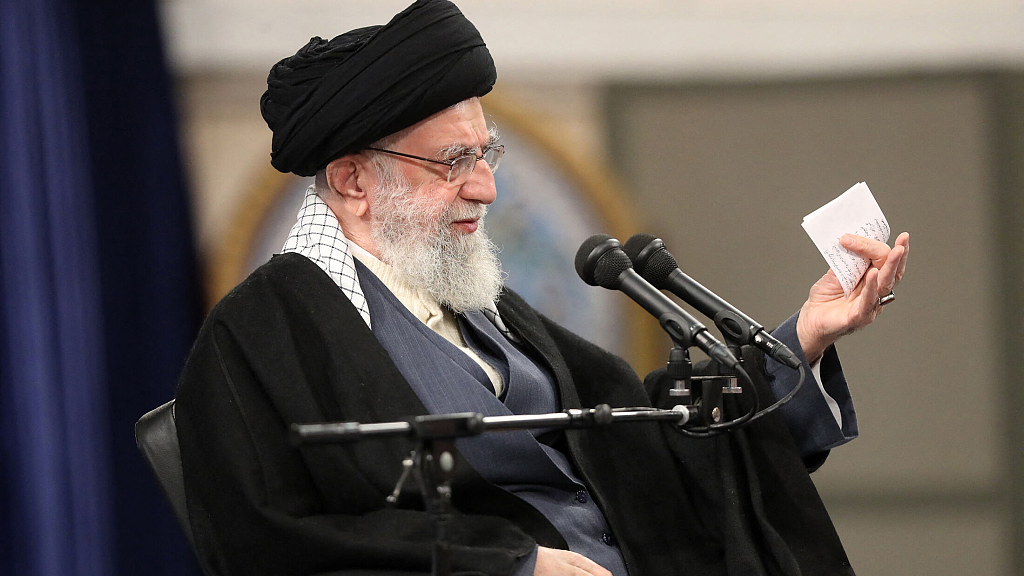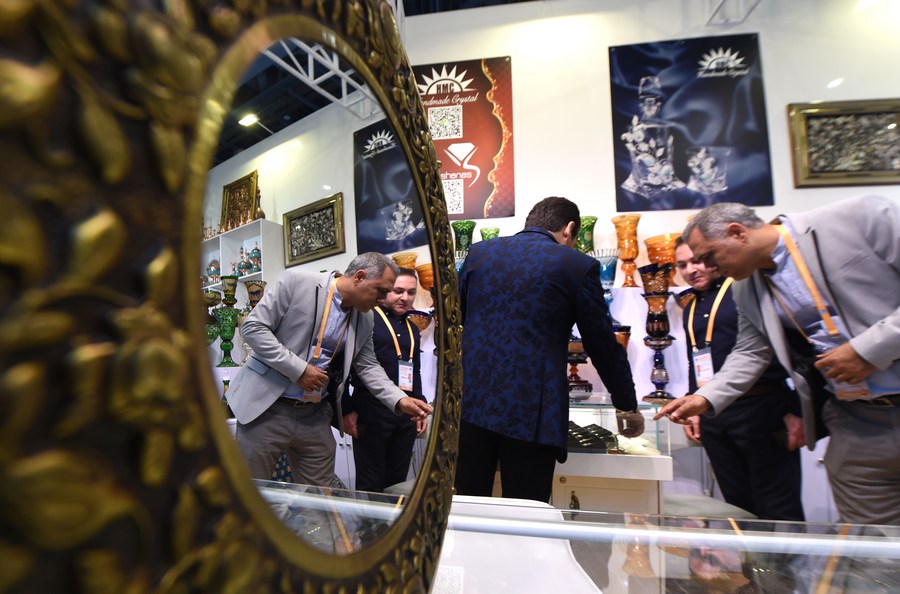
Iranian President Ebrahim Raisi delivers a speech ahead of the 44th anniversary of the victory of the Islamic revolution, in Tehran, capital of Iran, February 8, 2023. /CFP
Iranian President Ebrahim Raisi delivers a speech ahead of the 44th anniversary of the victory of the Islamic revolution, in Tehran, capital of Iran, February 8, 2023. /CFP
Editor's note: Hamzah Rifaat Hussain was a visiting fellow at the Stimson Center in Washington, D.C. He is also an assistant research associate at the Islamabad Policy Research Institute and specializes in conflict dynamics and foreign relations between countries. The article reflects the author's opinions and not necessarily those of CGTN.
Iranian President Ebrahim Raisi's first state visit to China on the invitation of Chinese President Xi Jinping in 2023 is historical and carries immense significance for the China-Iran strategic partnership.
Diplomatic relations between the People's Republic of China and the Islamic Republic of Iran were established in 1971, while their ties remain anchored in mutual trust, apolitical strategic cooperation in the absence of hostilities and joint contributions to domestic, global and regional prosperity. The visit, which is the first by an Iranian President in over 20 years to China, carries more than symbolic significance.
The Iranian President is accompanied by an elaborate delegation, which includes Iran's Central Bank Chief Mohammad Reza Farzin, top nuclear negotiator Ali Bagheri Kani – who has held talks with the West to restore the nuclear deal – and ministers of economy, petroleum, foreign affairs, trade, transport, urban development and agriculture.
The first time the two presidents met was in Samarkand, Uzbekistan, on the sidelines of the 22nd meeting of the Council of Heads of State of the Shanghai Cooperation Organization, which was when President Xi underscored support for Iran to become a full member of the organization.
Prior to his tour, President Raisi in an op-ed for People's Daily wrote: "The two living and dynamic civilizations were connected together through the historical Silk Road and ascertained the fact that prosperity and happiness as desirable, popular goals can only be achieved through interaction and cooperation."
This goodwill is what both nations seek to achieve and the visit comes at an opportune time for them.

Exhibitors from Iran are seen at the Trade in Services exhibition area during the second China International Import Expo in Shanghai, China, November 5, 2019. /Xinhua
Exhibitors from Iran are seen at the Trade in Services exhibition area during the second China International Import Expo in Shanghai, China, November 5, 2019. /Xinhua
As stated by President Raisi's deputy for political affairs Mohammad Jamshidi, the main goal of the visit is to finalize the operational mechanisms of the 25-year comprehensive cooperation agreement signed between the two countries in 2021, which will strengthen strategic cooperation on energy, infrastructure, technology, and health care.
As part of strong bilateral political ties, the Chinese Consulate General in Iran's port city of Bandar Abbas officially opened in December 2022, which is the first Consulate General in any Middle Eastern country. These are important considerations for this visit given that the Comprehensive Strategic Partnership have entered the implementation stage in 2022, while Iran continues to be ravaged by U.S. sanctions that stifled its economic growth potential.
President Raisi is also scheduled to sign more cooperation agreements with President Xi, meet with Iranian and Chinese corporate leaders and touch base with the Iranian diaspora in China. The meetings would build on existing trading ties and soft power diplomacy, which has been the hallmark of their historical bilateral relationship.
Figures support the rising significance of trade ties. China remains Iran's largest trading partner where according to Iran's customs data, Iran exported $12.6 billion worth of goods to China and imported $12.7 billion based on the Iranian calendar year that ends in March 2023. China is also a major buyer of Iranian oil and continues to invest in major fields ranging from mining and oil to transportation and agriculture. The relationship is a win-win for all.
President Raisi's visit to Beijing in 2023 reaffirms that both nations stand against hegemonic designs and unilateralism that have weakened the world order. For example, Iran has received unfair treatment over its nuclear program due to the Donald Trump administration's withdrawal from the Joint Comprehensive Plan of Action (JCPOA).
To tackle unilateralism, both China and Iran unequivocally stand for an equitable and just world order in the absence of discrimination. Hence, this presidential level visit is a good omen for Iran, which has been repeatedly threatened due to great power politics, particularly from the United States. Meanwhile, Iran has appreciated China's constructive role on negotiations towards resuming Iranian compliance with the JCPOA, which contributes to greater strategic parity, nuclear restraint and a securer world order. Such diplomacy is crucial for global peace.
Accordingly, President Raisi's visit to Beijing propels the all-weather, strategic relationship between Beijing and Tehran to greater heights. This is precisely what is needed now.
(If you want to contribute and have specific expertise, please contact us at opinions@cgtn.com. Follow @thouse_opinions on Twitter to discover the latest commentaries in the CGTN Opinion Section.)